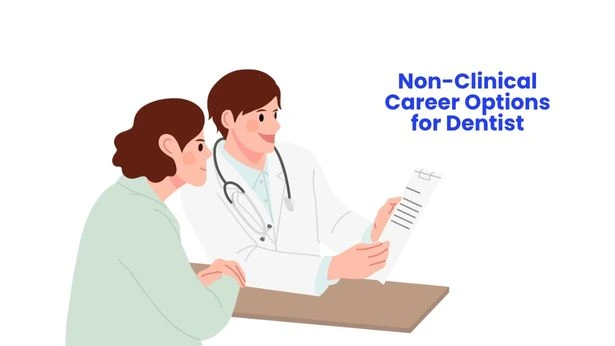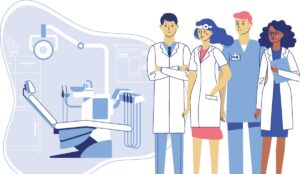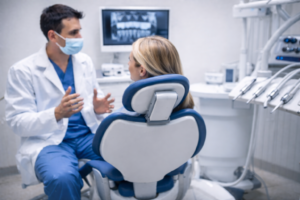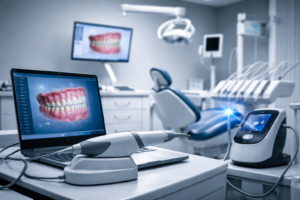Ways on How to Use Your Dental Degree: Alternative Careers and Non-Clinical Opportunities
While most dental graduates think about traditional clinical practice as their main career pathway, learning how to use a dental degree outside dentistry can open doors to a substantial number of alternate careers where they can apply their skills beyond the clinic. Whether you are pursuing more flexibility, more challenges, different types of professional settings, or you simply want to know your career options after dental school aside from practicing clinical dentistry, knowing you have other options can lead to exciting opportunities.
In this blog, we will review several non-clinical jobs for dentists with a dental degree, how you can use a dental degree outside of dentistry, and provide examples of emerging dental degree career paths outside of dentistry that align with a variety of interests and aspirations.
Why Consider Alternative Careers for Dental Graduates
Although clinical practice continues to be a rewarding and popular career path, other dental graduates may find that a traditional career path within dentistry doesn’t entirely fit their personal or professional goals. Many reasons, including personal aspects of work-life balance, physical aspects of dentistry, or, possibly, a passion for another field, lead many people to consider new pathways.
The good side is that a dental degree is a great foundation in health care, science, communication, and problem-solving skills that are transferable and valuable in many sectors. Considering non-clinical careers for dental graduates can lead to rewarding opportunities in education, research, administration, business, and many more.
List of Non-Clinical Jobs for Dentists with a Dental Degree

If you are curious about how to use your dental degree outside of dentistry, some well-known non-clinical careers for dentists are given below:
1. Dental Education and Academia: Many graduates with a dental degree pursue careers as educators and help teach future dentists or dental hygienists. In academia, you may teach or conduct research.
2. Dental Public Health: In public health, dentists concentrate on improving the oral health of communities at the population level by developing policies, prevention activities, and promoting the overall oral health of communities.
3. Dental Research: A dental degree is an excellent foundation for research careers in universities, private companies, or healthcare organizations. Research can be new materials or treatments, or epidemiology. Researchers contribute to knowledge in the area of oral health science.
4. Dental Industry and Product Development: As a dentist, you can work for companies whose business is to produce dental products or drugs, or dental instruments. This is a blend of practice and business knowledge.
5. Medical and Dental Writing: Medical writing can be a good and growing career path for someone with great writing skills. Dentists can write articles for journals, educational materials, patient information, or regulatory documents related to the practice of dentistry. This will satisfy your craving for scientific knowledge and writing.
6. Healthcare Administration and Management: Dentists can work in leadership administration as part of a dental practice, hospital, or healthcare organization. Many administrative positions involve management of operational areas like finances, human resources, strategic direction, and policy and procedures, and dentists can provide insight from their clinical training and work experience, combined with an ability to practice in management roles.
7. Legal and Forensic Dentistry: Some dentists work in forensics who assist police in making identifications related to a legal investigation, or as consultants or expert witnesses in a legal case related to dental malpractice or personal injury.
List of Career Options After Dental School: Besides Practicing Clinical Dentistry
There are non-clinical roles for dentists using their dental qualifications, but many graduates leverage their medical/dental background with new qualifications to broaden their career options:
1. MBA or Health Administration Programs: Business education may equip dentists with the knowledge and skills necessary to take on executive roles in healthcare management, policy, or consulting.
2. Public Health Degree: A Master’s degree in Public Health (MPH) can help combine your dental training with formal training for roles in community health as a leader, researcher, and educator.
3. Teaching Credentials: Adding teaching certificates allows dentists to become faculty in K-12 education or colleges outside of dentistry.
4. Technology and Innovation: Dentists interested in technology could pursue dental informatics, telehealth, or app development related to oral health issues.
These are just some examples of how a dental degree can provide the foundation for many different career paths.
How to Use a Dental Degree Outside Dentistry: Tips for Transitioning
When moving toward non-dental opportunities, you will want to have a plan. Here are some suggestions on how to utilize your dental education outside of clinical practice.
1. Determine your interests: Take time to reflect on the motivations behind your career search. Are you interested in research, teaching, business experiences, or social causes? Knowing your aspirations will help you decide which steps to take.
2. Seek out further education: Pursue additional certifications, diplomas, or degrees that complement your education as a dentist and allow you to move into other sectors such as education, research, or social services.
3. Network purposefully: Find professionals in the career you are interested in. You can find connections through conferences, professional social media platforms, or dental alumni groups.
4. Ensure your resume includes skills: This includes your communication skills, problem-solving capabilities, and clinical knowledge. Important things to consider emphasizing during interviews as well.
5. Get relevant experience: Get involved with your desired sector through volunteer work or an unpaid internship, so you can gain relevant experience and build credibility in your newly identified area.
Also Read: Top Locations For New Dental Graduates
Dental Degree Career Paths Beyond Dentistry: Emerging Trends
As the healthcare landscape continues to change, there will be new challenges. Here are just a few of the options that may unfold:
1. Tele-dentistry and Digital Health: Providing online consultations and utilizing various digital methods to provide patient care and education.
2. Dental Entrepreneurship: Creating a business within the dental technology space, consulting, or wellness industries.
3. Global Health Initiatives: Collaborating with global organizations to enhance oral health in underserved communities.
4. Health Policy and Advocacy: Participating in government and organizational advocacy related to legislation and policies that relate to oral health and health care delivery.
The options provided above demonstrate the wide array of potential pathways available from your dental degree today.
Final Call on Use Your Dental Degree and Exploring Alternative Career Paths
When looking for alternative careers for dental graduates, you find so many great opportunities outside of clinical dental practice. There is a pathway of non-clinical jobs for dentists who have a dental degree, plus models like combining your expertise and additional qualifications. What is important is that knowing how to use a dental degree outside of dentistry can allow you to have jobs that are interesting and allow for work lives that align with your passion.
Whether you see yourself in teaching, research, administration, or a new sector with innovative industries, knowing what your options are after dental school, besides practicing clinical dentistry, can help you to take charge of your career path as you please.
Ready to explore your dental degree options? If you’re considering new directions and want expert guidance, connect with Hire Smiles. We specialize in Dental Recruitment services, helping dental professionals navigate diverse career paths and find opportunities that match their skills and ambitions. Contact Hire Smiles today.
FAQs on Ways to Use Your Dental Degree
Q1. What other career options are available to dental graduates?
The other career options are teaching, research, public health, industry roles, health administration, and legal dentistry are typically the most applicable alternatives.
Q2. Can a dentist practice in a non-clinical capacity with a dental degree?
Yes, dentists transitioned from clinical practice to find meaningful roles in education, administration, writing, and the dental industry.
Q3. How can I turn my dental degree into a career other than dentistry?
You can transfer your dental degree into other careers by obtaining more training or emphasizing transferable skills such as communication and research.
Q4. What options do we have other than an active practice after completing dental school?
One could work in public health, education, product development, manage a healthcare group, or consider forensic odontology.
Q5. Do we need to obtain further education to become a dental graduate in a non-clinical career?
Usually, yes, and a degree or certificate in public health, business, education, or a related field will help.
Q6. Is working in medical or dental writing a good career for dental graduates?
Yes, it is an excellent career option, and the writing aspect gives graduates the opportunity to use the scientific knowledge and excellent communication skills.
Q7. Can a dentist work in healthcare administration or managed care?
Yes, many dental graduates who have left clinical dental practice move into administrative roles to manage health system operations or to develop policy.
Related Article: How to Find a Dental Job after Graduation





